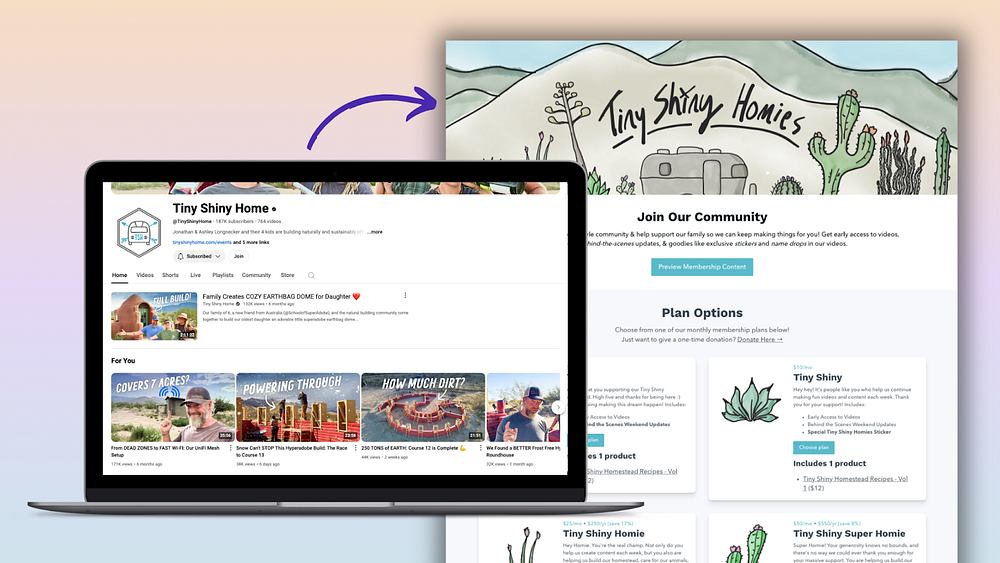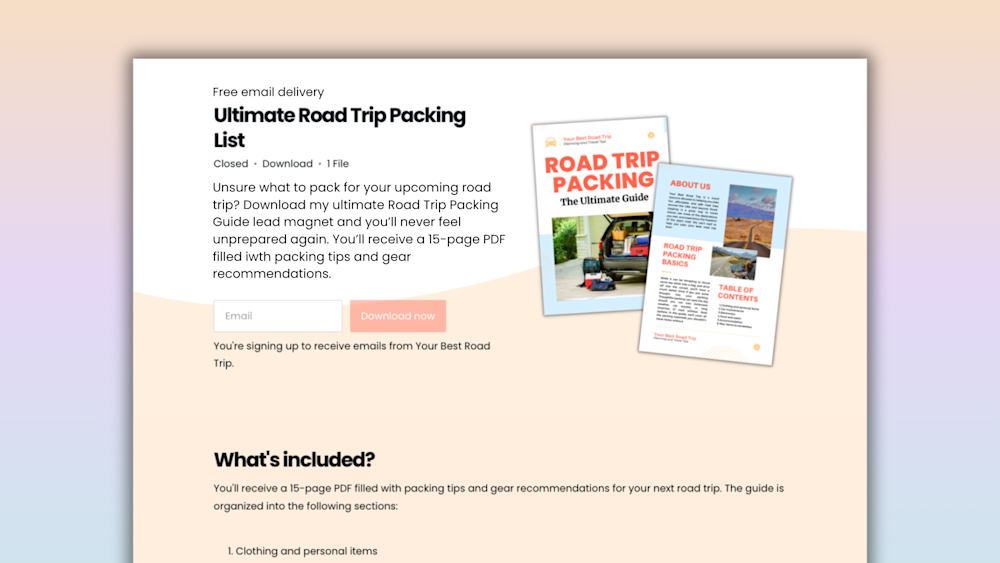You’ve finished editing your latest podcast and are about to drum up a new list of episode topics for the coming months.
You take a proud moment to soak in the satisfaction of consistently publishing episodes.
Your podcast audience is growing.
But while you’re happy with the expanding size of your audience, your podcast still seems to be missing something.
Shouldn’t you be making money and leveraging your growing audience?
In a word: yes.
In some more words: If you’re wondering how to monetize your podcast, you’re in the right place.
Today, we’ll share with you the benefits of hosting a podcast, how to start one if you’re still on the fence, and end with six key ways to monetize your podcast.
Let’s dig in.
What are the benefits of hosting a podcast?
#1. Podcasts generate traffic to your brand
There are numerous benefits to podcasting, but the main advantage is podcasts can drive significant traffic to your business.
For your listeners, podcast episodes are easy to consume, they’re portable, and can be accessed on-demand.
You know how you carry your smartphone with you everywhere?
The same convenience goes for podcasts. Over 23.9 million users listen to podcasts from their smartphones, making it ultra-convenient for your audience to digest.
This convenience drives traffic as few other formats can.
For instance: Founder of Smart Passive Income, Pat Flynn, grew his podcast to over 48 million downloads within seven years of launching.
A whopping 19% of Pat’s audience said they found him through his podcast.
Powerful, right?
(Don’t worry, success doesn't take seven years. Like search engine optimization (SEO) tactics, podcasts deliver more results over time. Many creators see their audience blossom within their first six months to a year.)
More generally, podcasts are still burgeoning among consumers, making this an ideal platform to build an audience.
As of April 2019, there are over 700,000 podcasts and 29 million episodes. This is a staggering number considering Apple reported 555,000 podcasts last year. Put another way, podcasts have grown 26% year-over-year.
In fact, in the US alone, the number of podcast listeners has more than doubled over the past decade. As of today, 51% of the population has listened to a podcast.
Bottom line:
Leverage the increasing demand for podcasts to grow your audience and increase brand awareness.
Speaking of audiences, podcasting doesn’t just provide a medium to grow your customer base -- it does wonders for making those customers loyal, too.
#2. Podcasting builds a loyal audience
Podcasts provide your audience with a highly engaging format that builds a strong and loyal relationship with your brand.
How? Because they can hear your voice, your audience can quickly get to know you and form an emotional connection.
And an emotional connection is something that drives customer value. In fact, people who develop a bond with a brand are over 50% more valuable than the highly satisfied customer.
Plus, consider this: 80% of podcast listeners listen to all or most of each podcast episode.
Which means your audience is attentive and actively engaged in what your podcast has to say, especially if your content provides educational value.
After all, educational content builds trust among your audience. 64% of consumers feel a brand is trustworthy immediately after they read a brand’s piece of educational content.
So imagine that effect after your audience hears educational content in your podcast episode. Very impactful.
The main point is to build a loyal following by providing valuable and educational content to your podcast listeners. This positions you as a trustworthy expert on your subject.
And, as our next benefit demonstrates, when you build trust among your audience, you can leverage that to earn a profit in return.
#3. Podcasts are profitable
With the increasing number of podcast listeners on the rise -- and your ability to build a loyal, trusting audience -- there’s ample opportunity to earn a profit.
A prime example of a profitable podcast is the popular show Entrepreneur on Fire.
Founder John Lee Dumas earns thousands per month in sponsorships and has generated over $300,000 per month selling his online course to his podcast listeners.
Here’s a snapshot of one of John’s monthly income reports from his podcast:
(Keep in mind that while sponsors have done wonders for John, you don’t have to rely on sponsorships as he does. There are numerous other solutions, and we’re covering several of them today.)
In sum:
Podcasting presents your business with an opportunity to drive more traffic to your brand, build a loyal audience, and generate profitable revenue.
Sound appealing, but you haven’t launched a podcast yet? Don’t worry. It’s easier than you might think.
How do you start a podcast?
Starting a podcast is fairly straightforward. In fact, per Pat Flynn’s recommendation, you can streamline the process in just seven top-level steps:
-
Choose your podcast topic
-
Create your podcast cover art and description
-
Set up your equipment
-
Plan your episodes
-
Record your episodes
-
Edit and publish your episodes
-
Launch your podcast
If you’re looking for a seamless publishing and hosting process, Transistor.fm is a great solution that stores your MP3 files, generates your RSS feed, and gives you hosting analytics.
Here’s a peek at Transistor’s hosting analytics dashboard.
Nice and manageable, yeah?
Another great option is Simplecast, a platform that provides tools for managing, distributing, and sharing your podcast.
Like everything related to your business, explore options and choose one that best suits your needs and budget.
OK, so you’ve got the steps. Now, let’s talk about the financial aspect of starting a podcast.
Curious about the investment needed for your podcast?
The cost of running your own podcast can range for both your one-time startup and recurring expenses. Streaming radio station Live365 gauges the costs around:
-
$290-3,700 for necessities and additional costs
-
$705-5,185 for necessities with extras and additional costs
-
$5-100 per month for recurring hosting costs
What exactly are the necessities, extras, and additional costs? Check these out:
-
Necessities include your equipment like a computer, recording and editing software, a microphone, and a pair of headphones.
-
Extras include equipment enhancers like a microphone boom and stand, headphone amplifier, cables, computer monitor, shock mount, or mixer.
-
Additional costs include your cover art, intro and outro music, and any other audio needs you may have.
If you’re curious about how much time you need to invest, entrepreneur, podcaster, and founder of PodSchool Rachel Corbett is a good example to follow.
Rachel spends about five hours to edit a one-hour interview. Beyond editing, Rachel spends additional time promoting each episode, so all-in-all, it takes her around 10 hours per episode.
Of course, the shorter your interview, the less time you need to spend recording and editing. Do consider, though, the more people you involve -- such as a co-host -- the more involved the editing process can be, which further extends your time investment.
Not as bad as you thought, right?
Monetization is pretty simple, too. How simple? Let’s check it out.
6 ways to monetize your podcast
#1. Use affiliate links to earn an income from your podcast
Affiliate marketing is an excellent solution for generating revenue from your podcast. Although affiliate marketing is typically associated with bloggers, it yields big rewards for podcasters, too.
If you’re not familiar with the term, affiliate marketing entails promoting an outside merchant’s product or service in your podcast in exchange for a commission on any sales made through your audience.
A few affiliate programs you can explore for potential products to promote in your podcast include:
-
Podia Affiliates (Pretty generous terms, I hear.)
Just as you would disclose affiliate links and blog monetization endorsements to your readers, the same goes for your podcast listeners. In the US, it’s an endorsement requirement and ethical business practice.
As for how many products to include in your podcast, 42.17% of affiliate marketers prefer 1-10 products, so try not to go beyond 10 product mentions in your podcast series.
Our next tip also provides a way to generate income by selling to your podcast audience, but, rather than selling an outside product, you offer yours.
#2. Offer digital products like ebooks to your podcast listeners
With digital product sales on the rise and growing demand for online shopping, offering popular digital products such as ebooks is a great way to monetize your podcast.
As a whole, the US digital media market is expected to reach a new peak of nearly $26 million in revenue by 2023, making today’s market ideal for publishing and selling digital downloads.
You don't have to create a new product to leverage this monetization channel, either. Repurposing key content is an effective and common strategy among podcasters.
For instance, Jon Nastor, the creator of the popular podcast “Hack the Entrepreneur,” repurposed core content from his podcast to create the Hack the Entrepreneur ebook.
Although he doesn’t currently charge for his ebook, he offers this valuable free digital download to grow and nurture his email subscriber list.
Using his ebook as a lead magnet as such allows Jon to warm up his prospective clients through a relevant email sequence nudging them to purchase premium products, like his Define Your Twenty online course about productivity and focus.
Of course, ebooks aren’t your only digital product option.
#3. Create a membership for your podcast audience
Another great way to monetize your podcast is to create a membership site offering your online community exclusive content in exchange for a recurring fee.
For example: Shortly after Don McAllister, the founder of ScreenCastsOnline, became a full-time podcaster back in 2006, he created a membership site which offers his like-minded audience access to updated tutorials for Apple devices.
Don’s success continues today, as you can see below.
He charges $72 for an annual membership or $8 for a monthly membership to provide his members with unlimited access to his video library, various member apps, and two new tutorials per week.
Another example of membership and podcast success is Justin Jackson. Justin has pulled in $116,740 in revenue from his MegaMaker Club membership site for his podcast audience since launching in 2013.
(Want to follow in his footsteps? Start your 30-day free trial of Podia today.)
In addition to memberships, our next option is also great for leveraging your valuable content.
#4. Sell an online course to your podcast listeners
Another podcast monetization option is to sell an online course to your podcast audience. Loyal podcast listeners are tuning into your episodes regularly to benefit from the knowledge you’re sharing.
More importantly, they’re interested in achieving a specific result from that knowledge.
What better way to package up your results-driven content than in the format of a profitable online course?
Knowing there’s no time like the present, let’s talk about how to sell your online course.
You can sell directly to your podcast audience by mentioning your online course during an episode. That’s what Nathan Amaral did, selling one of his $15,000 courses to a podcast listener during an episode.
Pretty impressive.
Another example is successful fitness expert and podcaster, Chalene Johnson, who built a large following from “The Chalene Show” podcast. Chalene sells a relevant online course to her audience about resetting your metabolism called the 131 Method.
As demonstrated by Nathan and Chalene, your captive and engaged audience is ready to learn more about your featured topic, making your online course a natural transition for monetization.
In a nutshell:
Reformat educational content that captivates your podcast audience and turn it into an online course that helps them achieve a specific, related result.
By doing so, you can earn a significant income selling your online course, while also solving your audience’s biggest problems. Win, win.
#5. Use paid ads and sponsorships to earn an income from your podcast
An alternative way to make money from your podcast is to publish ads from paying advertisers in your podcast episodes.
When you promote an advertiser’s product or service in your show, they pay you a fee for the exposure.
To find advertisers for your podcast, there are three main ways to do it:
-
Use a podcast advertising network like AdvertiseCast or Midroll.
-
Use a podcast host. Hosts like Blubbry and Libsyn often reach out to podcasts hosted on their service with ad opportunities.
-
Find your own advertisers. As you build your podcast audience, generating interest among advertisers will become a lesser hurdle. If your show ranks well in iTunes, for example, it’s likely advertisers will reach out to you.
Speaking of iTunes, while you don’t get paid for your podcast downloads, the platform acts like a podcast search engine and allows you to attract advertisers as well as grow a broader audience.
If you’re curious about ad rates, the average podcast advertising rates hover around $22 cost per 1,000 impressions (CPM) for a 30-second ad and $36 CPM for a 60-second ad.
The average rate is based on podcast audience size and number of downloads per episode per 30-day period. Of course, the larger your podcast audience, the higher your ad rate.
For example, if you have between 500-999 listeners per episode, your 30-second ad CPM is $18 vs. $29 for an audience size between 100,000-999,999 listeners per episode.
The CPM model also applies to generating revenue from sponsors, where you find outside businesses to pay you for every 1,000 listener impressions per pre-roll, instead of per ad.
(If you’re not well-versed on podcast jargon, a pre-roll is where the podcast host advertises the sponsor’s product during the show. 15-second pre-rolls are typically announced before the podcast, and 30-second pre-rolls are usually inserted into the middle of the episode).
Using this model, you can generate $18 per 1,000 impressions (or listens) from a 15-second pre-roll or $25 per 1,000 impressions from a 60-second pre-roll.
Again: don’t fret if you don’t have a massive podcast audience. So long as you continue to pump out consistent and valuable content, your audience will grow over time, and that’s what matters most.
Paid ads and sponsorships aren’t the only people you can partner with, either.
#6. Secure listener donations to increase your podcast revenue
You can also ask your listeners to support your podcast, just like public radio stations do.
You can do the same by accepting donations on your podcast. Simply mention in each of your episodes your show is listener-supported and provide easy directions on how to contribute.
Simple and crowdfunded -- does monetization get any better than that?
Bonus tip: Book speaking gigs
We’ve got one more for you today -- you can also monetize your podcast through speaking gigs.
Your podcast audience is an ideal source for booking speaking engagements.
Why? Your show can attract related events and organizations who are interested in learning more about your subject matter.
And there’s no better educator than the creator of your podcast -- you. After all, you’ve been positioning yourself as an expert on your topic through the valuable content delivered in each episode.
As founder of Marketing Showrunners, Jay Acunzo, puts it:
“Use your podcast show to build your speech. You can aerate your ideas and stories to an audience that trusts you and see what worked and what didn't. Your speech can thus be a rollup of your absolute best material.”
Jay’s podcast, Unthinkable, is a great source of leads for his speaking business, which makes up the majority of his income. In fact, in 2016, his speaking fees made up 100% of his income.
This year, Jay expects his speaking revenue to make up about 40% of his income with 10-12 gigs booked for 2019.
Pretty sweet, right?
All in all:
There are several creative ways to monetize your podcast. These monetization methods are proven and profitable, too.
An important takeaway is to continue to serve your audience first. Provide your loyal following with valuable educational content and keep it your priority.
If you do that -- regardless of the monetization option you choose -- the money will come.
Leveraging your growing podcast audience for income is simple
Podcasts are here to stay and easy to monetize. You just need the right information at your fingertips and a strong commitment to your audience.
Let’s recap:
-
The benefits of hosting a podcast include increasing your site traffic, building a loyal audience, and making a profit.
-
To start a podcast, focus on picking a topic, creating brand collateral, and managing content production. Beyond that, you also need to plan out your time and money investments accordingly.
-
Start monetizing your podcast by using an affiliate marketing program or selling your own digital products. Paid memberships, online courses, and ebooks are easy products to transition to from your podcast.
-
Finally, you can also generate revenue from your podcast through paid ads, sponsorships, or even listener donations.
The world of podcasting is brimming with possibilities for you to monetize and grow your business.
Here’s to you and your endless podcast-monetizing success. And if you need a platform to start building out all of your fantastic monetization ideas, we'd love to have you at Podia. Start your 30 day free trial today.



